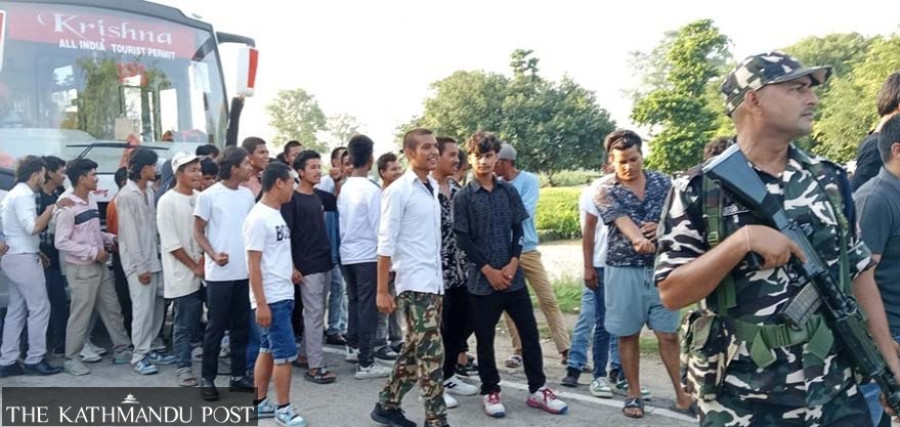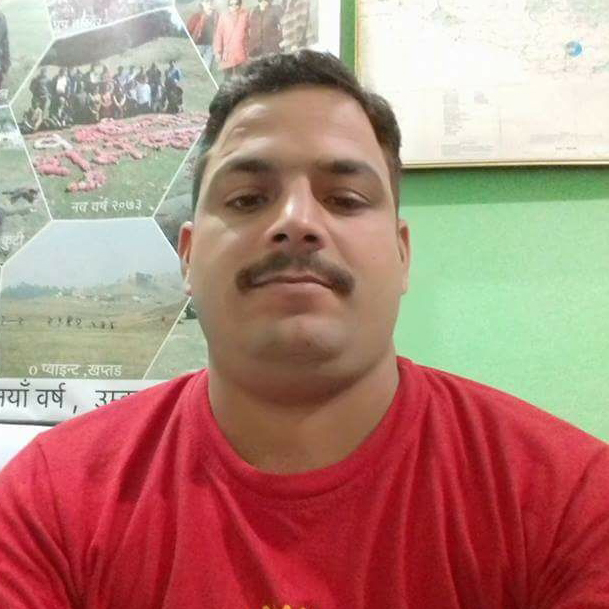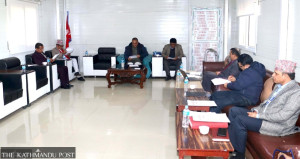Sudurpaschim Province
Rescued from captivity in India, 57 Nepalis return home with tales of abuse and deception
Trafficked on promises of well-paid jobs, survivors say they were confined, starved and forced to lure others.
Bhawani Bhatta
Man Bahadur BK, 13, left his home in Kailali, hoping to ease his family’s hardship. With both parents ill and no source of income, he mortgaged his land to borrow Rs40,000 after a neighbour promised him a job in India’s Rudrapur, for which 23,000 Indian rupees was required upfront.
But when he reached Rudrapur in the northern Indian state of Uttarakhand, the reality was starkly different. He was held in a hostel briefly, then moved to a house where his phone was seized, and the promised job never came.
“They said it was easy work and good pay. But I ended up in something like a jail,” he said through tears at the Gaddachauki border as he returned to Nepal on Wednesday.
BK was among 57 Nepalis from 18 districts rescued in recent days by Indian police in coordination with a NGO, Kin India, from what authorities say was a trafficking and forced confinement network operating in Rudrapur and Kashipur.
Victims say they were lured with promises of lucrative jobs, housed in poor conditions, given barely enough food, and pressured to recruit others.
“They told me I’d earn 23,000 Indian rupees a month and get a good meal every day,” said Bishal Budhathoki, 20, from Kaski. “But they locked us up and made us call friends to come over.”
Budhathoki said he was contacted by a man named Navin from Dharan, who used another Nepali man’s number —Birendra Shahi— to chat with him. Upon reaching Rudrapur, Budhathoki handed over the money to Shahi and was initially treated well for a week before being locked in a room with other Nepalis. The traffickers would allow access to phones only during recruitment calls to friends.
Budhathoki’s brother, Suman, had arrived in India four months earlier. After spending a month in Rudrapur, he and others were taken to Kashipur, where, according to victims, the abuse worsened — beatings, threats and forced confinement.
One victim, 27-year-old Som Limbu from Taplejung, reportedly died a month ago while still in captivity. His death prompted a complaint at the District Police Office, Taplejung. Police informed the home ministry about the case and later reported to the embassy in New Delhi. Only then did authorities learn that dozens of Nepalis were being held against their will.
Navin Joshi of Kin India said the rescue operations were conducted after weeks of surveillance. “Once we confirmed their locations, we worked with Uttarakhand police to raid the houses,” he said. “In Kashipur, they were lining up victims and forcing them to call home. Bouncers were stationed around to intimidate them.”
Joshi said 35 hostages were rescued from Kashipur in the first raid. The next day, 22 more were freed after traffickers shifted locations to a forested area nearly 30km away. Some victims had fled into nearby fields but came into contact the same evening.
According to Joshi, three small rooms housed 32 people. “When police detained Birendra Shahi, the others finally began to speak up,” he said.
Police also arrested Manish Tiwari, who allegedly worked with Shahi. Documents recovered from them suggest they had been operating since 2018, collecting money from job seekers and making them recruit others.
Authorities believe similar operations exist elsewhere in Uttarakhand and suspect that over a hundred others were trafficked and quietly sent back home without formal rescue. “We’ve received information that some are being relocated to avoid detection,” Joshi said.
The 57 rescued Nepalis were brought back via the Gaddachauki border on Wednesday, where they were received by Kanchanpur’s Chief District Officer Laxman Dhakal and Sudurpaschim Province Police Chief Dambar Bahadur Bishwakarma.
CDO Dhakal said they are now being sheltered in Mahendranagar, with food and lodging arranged by the Federation of Nepalese Chamber of Commerce and Industries, Kachanpur chapter. Mahakali Yatayat is coordinating transportation to their hometowns.




 16.12°C Kathmandu
16.12°C Kathmandu















